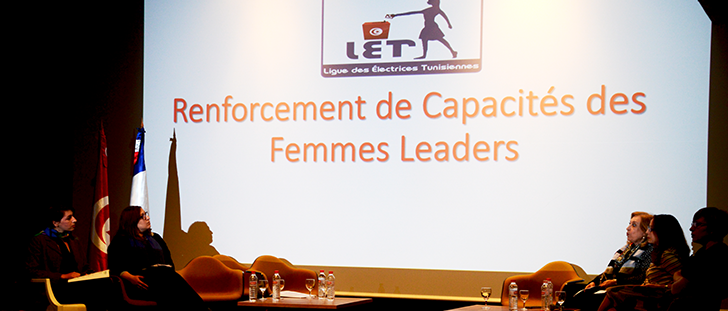International Women’s Day is celebrated in many countries around the world. It is the day when women are recognized for their achievements, regardless of national, ethnic, linguistic, cultural, economic or political divisions. In this context, a conference took place at the French institute of Tunisia in partnership with “UN Women” on Wednesday, March 8, with the theme “Women and politics in Tunisia”. In this conference taking place on the eve of municipal elections, various women from different backgrounds, political and civil society discussed women’s participation in political life and focused on issues facing women nowadays.
The program begun with a welcome word from MmeHéla SKHIRI, National Women’s Program Officer and Patrick FLOT, director of the French Institute of Tunisia. Mrs Soukeina BOURAOUI, Director of the Center of Arab Women for Training and Research (CAWTAR), then moderated the debate in which the speakers first introduced the current role of Tunisia’s women. Mrs BOURAOUI encouraged Tunisia to ratify the Istanbul Convention, which lays the basics for the real protection of women. Later on, Mrs Lamia ZARGOUNI, Member of ISIE’s board and court judge, talked about the place of women in the 2014 elections and the future challenges. According to her, many municipalities are not ready for the coming elections since a certain form of violence against female candidate persists for only 30.80 % of MPs are women, 0 % governors and 19.5 % only members of the government.
Anware MNASRI, judge and founder of the Tunisian League of Women Voters and of Thala, presented the law of parity in the national assembly and reminded that the article 46 of the constitution promotes this value and is committed to protecting women acquired rights, supporting them and working on improving them. However, we still find Tunisian women without an identity card which prevents them from voting, it also explains why few women hold political leadership positions. On the other hand, Mrs Hafidha CHEKIR, member of Tunisian Association of Democratic Women explained the legal framework for the participation of women in political life and underlined the fact that despite their participation in the protest movements, women were not able to accede to the political representativeness in Tunisia, which brings us to the efforts made by the civil society such as “AswatTounes” to establish a network between women politicians through training sessions. “We would like the leaders of the political parties recognize the value of this training” pointed Mrs Nawrez Ellafi, major of the 2016 promotion of the political academy of women, project of AswatTounes.
To close the conference, Mr Loubna JERIBI, former president of the national constituent assembly, and current president of the parliamentary Think Tank of public policy “Soliar Tunisia” has demonstrated the challenges faced by women MPs and insisted that the political representation of women is not just a matter of law. Machismo is present in the facts.
Much progress has been made to protect and promote women’s rights in recent times. Yet, there is still work to be done.
هكذا قيّم مستعملون آخرون المقال
